Honourkeeper Read online
Page 15
There were no sounds as Nagrim made his last journey, only the harsh clack of metal on stone from the hearth guards’ boots. Even the forge hammers had stopped, the ever-present clang of the anvils held fast in respectful remembrance. Morek led the warriors down the central concourse of gilded flagstones, along the heavy path that would bring Nagrim to his disconsolate father.
Word had reached King Bagrik not long after Morek had entered the outer gateway hall, though none had yet related the precise details of what had happened or said explicitly that Nagrim was dead. It was unnecessary, the very manner of the prince’s return made that fact abundantly clear.
When Morek finally reached the king, at the end of the long, wide aisle, his face was grave. The hearth guard captain was the only one not wearing his full-face helmet. He did so out of respect for Nagrim and to his king on account of the news he was about to give.
‘We found him in a gorge, far to the north-east, beyond the grobi hunting trails,’ said Morek in a subdued tone.
Bagrik stared down at the body of his son with ice-cold eyes, his expression neutral and unreadable. He reached out and was about to touch Nagrim’s face, when he stopped and snatched his hand away as if scalded. To feel that gelid flesh, the chill of death beneath the skin… He would not be able to deny the truth before him. Bagrik felt a sudden tightness in his throat and rubbed it absent-mindedly.
Queen Brunvilda, alongside him, lightly squeezed her husband’s hand. Bagrik reciprocated the gesture and held on as if for dear life, imagining all the strength dripping out of his fingers as mortality came to claim him, just as it had claimed his legacy. Kandor was the only other dwarf present. He was standing below the dais where Bagrik clung to his throne with claw-like fingers, knuckles white from the constant effort of gripping. The merchant thane had his head bowed, unable to bring himself to look upon the slain prince.
‘Who was responsible for this?’ the king demanded, his voice steady but carrying an undercurrent of threat. ‘Who killed my son!’ he cried out in anguish, coming down from his throne and slipping from Brunvilda’s reassuring grasp to cradle Nagrim’s head. ‘My boy…’ Gently, so gently, he stroked back Nagrim’s hair, the tips of his fingers scarcely brushing the prince’s cold skin. When Bagrik looked up at his hearth guard captain, there were tears in his eyes.
‘It was not grobi,’ Morek told him, taken aback at first by the reaction of his king. His expression darkened when he added, ‘The arrows are that of the northmen, the ones plaguing the lands of the elgi.’
Bagrik’s jaw line hardened as if carved of granite. A mask of calm fury came across his face, smothering his grief like a hand upon a candle flame. There was the briefest glimmer of rogue emotion in his eyes as he regarded Morek. Regret.
‘Retribution,’ rasped the king, ‘I will have vengeance for this,’ he promised, getting louder. ‘Send word to the elgi. We’ll fight their war for them and crush these heathen bastards, who think they can attack the royal clan of Ungor without fear of retaliation.
‘Muster the armies. Every axe, every hammer…’ Bagrik said, ‘We are now at war.’
An aura of serenity existed in the Temple of Valaya. In the starlit gloom, a figure hunched over a stone slab below the mighty statue of the beneficent goddess. He was wrapped in a fur cloak, and his shoulders were slumped as if in defeat. Bagrik had ordered that his son be taken immediately from the throne room to the ancestor temple to await internment.
Following his declaration of war, the king had resumed his throne and gave curt orders for his bearers to take him to the temple after his son. To Morek he left the marshalling of the armies. Though grief and hurt unimaginable made him want to strike out, to bring swift retribution to Nagrim’s slayers, he knew the mustering would take time. Armouries would have to be stocked, warriors summoned, war machines made ready.
Word had spread throughout the hold with all the force and purpose of an earthquake, the ripples of the king’s anguish felt by all. From the hollow tunnels of the vaults to the busy workshops, guild chambers and clan halls, beards were tugged in despair and axes sharpened as all of Karak Ungor mourned and the thoughts of dwarfs turned to revenge.
Anger, hate – that would come. For now, Bagrik dwelt in a well of his own grief. Nagrim was laid before him, pale in death. The blood had been cleaned from his face by the priestesses, his hair was combed, his beard re-braided. The arrows that defiled the prince’s body had been removed, the wounds sewn shut, and he wore a robe of deepest purple in place of his battered plate and mail. Alongside him, upon a stone plinth, was the ancestral armour from the Iron Deep. Bagrik hardly dared to look upon it such was the pain of loss he felt. It seemed like so long ago now that he had shown it to Nagrim. All that it once stood for, hope, pride and legacy, was gone like ash before the wind.
Bagrik bent forward, stooping to kiss his son tenderly on the forehead.
‘Nagrim…’ he whispered, voice choking, and wept. It was a horrible sound, empty and raw, as Bagrik vented his emotions, hollowing himself out until all that was left was granite.
When the king had finally stopped sobbing he looked up, realising that he was not alone.
‘I have never seen you cry before,’ said the voice of Brunvilda.
Bagrik turned to his queen. Morek had escorted her and was waiting patiently at the threshold of the temple. Brunvilda’s eyes were full of pity and sorrow. All Bagrik could return was cold, hard stone.
‘It will be the first and last time,’ he replied sternly and started to walk past her, out of the temple.
‘Your legacy need not end with Nagrim,’ Brunvilda said. Her eyes conveyed her meaning.
Emotion returned like black clouds over a bright day, dark and full of promised thunder.
‘I have no son,’ snarled Bagrik, stopped next to Brunvilda, only a few inches from her face. He fashioned his vitriol into a bladed retort, ‘My only son is dead.’
Bagrik stalked away, bellowing to Morek for his armour once he had left the sanctity of the temple.
Brunvilda shared a worried glance with the hearth guard captain, who knew his duty and followed the king.
CHAPTER TWELVE
Those Left Behind…
Rugnir was alive. Though when he awoke and opened his eyes he wished he wasn’t. Pain seized his body before his blurring vision succumbed to clouds of black fog. It was like an anvil was resting on his chest, and he had to fight to breathe. Rugnir’s skull pounded like iron worked beneath a hammer, an almighty hangover vying with his physical wounds for the prize of causing the dwarf the most hurt.
‘Nagrim…’ Rugnir’s first intelligible words since his revival were rasped. He tried to get up but lances of agony brought him down again like a felled oak.
‘Be still,’ a voice told him, old, like grit worked over sandpaper. It had a cantankerous, chiding edge to it. Rugnir realised it was another dwarf.
His chest hard, like it was filled with too much bone, made his lungs tight, and his leg was stiff like petrified wood. Out of instinct, Rugnir reached down to the source of his pain. He got as far as the rough scrape of bandages before his wrist was seized by a hand that felt like gnarled wood and coarse leather.
‘Be still, I said,’ the gruff voice repeated.
Rugnir tried to see his saviour, but all he got for his efforts was spikes of hot pain and a vague silhouette. Abandoning that course of action, he closed his eyes and dimly recalled being struck by arrows, though the details were indistinct. He’d hit the ground hard, the stink of blood and metal filling his nose and mouth. That’s when the darkness claimed him. Rugnir had expected to awake before Gazul’s Gate, and for the ancestor of the dwarf afterlife to bar his passage into the Halls, and consign him to limbo for his contemptible deeds. This was not the Gate, nor was the hazy figure sat beside him Gazul, the son of Grungni and Valaya. This tenebrous chamber smelled of earth and stone and damp.
Howling wind told him he was still in the mountains, the noise oddly hollow and far away.
Rugnir suspected his injuries, self-inflicted and otherwise, were to blame for that. Dripping water echoed dully, like he was lying at the bottom of a deep well or inside a cave, but boomed with a thunderous clamour. Rugnir grimaced at every drop, and that too caused him pain. Slowly, as his senses returned through the screaming wall of hurt, he realised he was not wearing his tunic and the softness beneath his recumbent body was from furs and skins.
A sudden panic gripped him as he remembered the gorge. The faces of the ambushers glared at him like ghosts. Rugnir tried to speak but found he lacked the strength. Desperately, he fought to get up again but couldn’t move.
‘You’re still weak,’ the voice told him. The distinctive aroma of pipe smoke filled the air. ‘Rest.’
Rugnir shaped a reply with his mouth, opening his eyes. Darkness swept over him, clawing its way into his vision and stilling his lips as he blacked out…
When he awoke again, Rugnir had no idea how much time had passed. It could not have been long; the other dwarf was still sitting beside him and smoking his pipe.
‘I warned you,’ he growled, getting to his feet and stomping over to what Rugnir’s gradually returning eyesight discerned was a stove. The old dwarf picked up a steaming cup that had been resting on it and brought it over.
‘Up,’ he barked, crouching down and lifting Rugnir’s head towards the proffered cup, so he could tip the contents into his mouth. ‘Drink,’ said the old dwarf.
It was some kind of broth, though the likes of which Rugnir had never tasted. Sweet, but with little flavour, it warmed his body and left an acrid aftertaste. Coughing and spluttering, Rugnir shied away from the cup but the old dwarf was insistent.
‘All of it,’ he growled, and held Rugnir’s head fast. It would not have been difficult; he was so weak even the smallest beardling could have forced him. Only when he finished did the old dwarf let Rugnir go.
‘What… what was that stuff?’ he asked of the old dwarf, able to croak the words.
‘Herbs, bark, hruk urine, all the good things a growing dwarf needs,’ he replied. ‘What does it matter what’s in it? You’ll drink it, that’s all you need know.’
Rugnir’s initial, half-comatose impression was right – he was an old, cantankerous bastard.
‘You saved my life,’ Rugnir continued, and with the affirmation came an overwhelming sense of grief. There was no one else in the cave with them. The others must have perished.
The old dwarf regarded him for a moment. His grey, unkempt, beard ruffled as he chewed on a piece of leather. He wore a dark green tunic with a cloak of furs, and a mail skirt hung down to his iron-shod boots. A mountaineer’s cap perched on his head, stuck with sparhawk feathers, and a worn hand axe hung from a thick, brown belt around his waist.
‘Keeps my pegs strong,’ he said, grinding the leather and showing a perfect set of square teeth, albeit tarnished with age. ‘Craggen,’ the old dwarf added, tapping his chest with his pipe, before pointing the supping end at Rugnir.
‘Rugnir,’ the dwarf replied.
Craggen gave a shrug of his mouth, as if the name meant little, then clamped the pipe between his lips and said, ‘I live alone in these mountains, hunting grobi, keeping out of the way. What’s your excuse for being out here?’
Rugnir told him about the grobkul, about Nagrim and the other rangers. Then he described the ambush, though he left out the attackers. That was only for him to know.
‘I must get back,’ he said, struggling to rise before the old hermit pushed him down again.
‘And waste all the time I’ve spent bringing you back from Gazul’s door? Are you a wattock? You were half-dead when I found you beside the river. You’ll last the time it takes for a grobi to stab you in your sleep!’
‘River?’ asked Rugnir, bleary-eyed. ‘What river?’
‘The river where I found you, that’s what,’ Craggen growled. ‘Alone, I’m sorry to say,’ he said sombrely, blowing out a thick plume of smoke as he considered the stricken dwarf. ‘You can barely stand, let alone walk or trek the mountains. No, you’ll remain here. The draught will heal you quickly. A few weeks and you’ll be back on your feet; a few more and you’ll be ready to leave.’
‘A few weeks!’ cried Rugnir, ‘I must return to the karak, immediately,’ he said, trying to get up again. His vision swam suddenly and Rugnir slumped back. The effort of even trying to get his shoulders off the ground was exhausting.
‘I must get back…’ he said, words slurring, his fading strength all but spent. Blackness enveloped Rugnir once more and he slipped into a fitful dream of blood and arrows and death.
Bagrik’s army mustered at dawn. For the first time in over two thousand years, the great gates to Karak Ungor yawned open and lines of dwarfs emerged like armoured ants.
Word had already gone ahead to the elves, brought by the king’s fastest runners, and was returned swiftly by carrier-hawk. One of the hold’s mountain rangers had taken the message to the king. They would meet at Broken Anvil Hill, fifty miles south of Tor Eorfith.
With standards aloft, the gold, copper and bronze catching on the rising sun, the dwarfs trooped out with regimented discipline. Six columns deep, they marched in perfect time with pipe, drum and horn. No rousing chorus of voices, no stirring refrain accompanied the instruments – the choristers, heralds and minstrels kept a sombre silence out of respect for the dead. Rangers were dispatched ahead of the main force, swathed in their cloaks and armed with crossbows and throwing axes. They would pave the way for the army, rooting out any threats and securing the path ahead.
It was the hearth guard, though, that led the line, the stern countenances of their bronze masks gleaming dully. Morek marched in the middle of their ranks, first out of the great gate, the horns on his helmet marking him out as captain. Haggar was directly to his right, holding the grand banner of Karak Ungor high, the red dragon snapping in the breeze.
Next came the longbeards, clad in their ancestral armour, which, even though it bore the scars of a hundred or more battles, still shone with polished brilliance. Bagrik travelled with them, carried upon his war shield by the royal hearth guard bearers. The king’s face was more severe than that of his bronze-masked bodyguards, as he rocked gently back and forth with the movement of the armoured warriors.
The longbeards were followed by the many clans, led in turn by their thanes and clan leaders. Warriors all, the hues and runes of the clans’ fluttering banners described their heritage and craft – rockcutters, lantern-makers, metalsmiths all come together in a mutual cause. Amongst their number were the hold’s quarrellers, crossbows shouldered as they marched beside their kin.
Between the massive phalanxes of warriors and longbeards was Hegbrak Thunderhand, master runesmith and former apprentice of Agrin Oakenheart. Though he was not part of the war host, the venerable runelord Agrin and his fellow runesmiths had toiled night and day in the build up to the mustering, fashioning rune weapons upon their anvils of power in the fuliginous depths of sweltering forges.
Hegbrak rode atop one of the anvils as it was heaved along by the Anvil Guard. Clad in rune-encrusted gromril, helmets wrought in the shape of their honorific, the Anvil Guard were warrior elites, devoted solely to the Runesmiths’ Guild, who wielded their great hammers with deadly efficiency. A youth compared to the venerable Agrin Oakenheart, Hegbrak was still a mighty runemaster, his rich tan hair fluttering in the breeze as he eyed the horizon.
Mule-trains brought up the rear of the vast column, hauling small carts heavy with baskets of crossbow bolts, axes, hammers and shields. There was ale, too, sloshing in broad casks, and chests of stonebread, oatmeal and other provisions.
War engines drawn by stout lode-ponies followed in the train – wooden stone throwers chased in bronze and brass, and hefty ballista with iron-headed bolts. They were accompanied by engineers, journeymen and warriors. Assorted victualers and brewers walked alongside the baggage train. Priestesses of Valaya, known as the Valakryn, were brought along too as battle
field surgeons. These ladies of the temple were warriors as well as healers, and carried axes and wore mail beneath their purple robes.
Last of all were the slayers, half-naked warrior fanatics that had sworn a death oath to seek their doom against the mightiest foe they could find or by performing the most insane feats of battle. The tattooed berserkers had attached themselves to the war host a few miles after it had left the hold, and acted as its unofficial rearguard.
The slayers were the only dwarfs to break the silence, bellowing oaths and war cries as they trooped along with their brothers. Some wore the skins of beasts like trophies: the shaggy furs of beastmen, hardened troll flesh, even dragon hide. Others painted their bodies to resemble bones and skulls. All wore their hair shaven into a blood-red crest, hardened with lime and grease, and gripped deathly sharp axes. Within their ranks moved the warrior-priests of Grimnir, the robed acolytes of the dwarfs’ fiercest ancestor god, ready to swear in others to the cult during the heat of battle.
When the hundred thousand-strong army left Karak Ungor, the great gate had thundered shut in its wake. At the king’s order Brunvilda had stayed behind, the queen watching from the Dragon’s Tooth as her husband and his throng departed for war. Grikk remained too, together with his ironbreakers, there to protect the hold in the absence of most of its warriors.
Unsurprisingly, the dwarfs had met no resistance on the road and arrived at Broken Anvil Hill in less than three days.
The muster point of the two armies was well named. A huge, rectangular plain scattered with crags and grassy hollows stretched for over a mile. A rocky promontory jutted out at opposite ends, forming thirty foot bluffs that fell away into lowland valleys scattered with trees. It was these vantage points that gave the hill its shape and its name, together with a ten foot deep cleft that ranged partway down the middle.

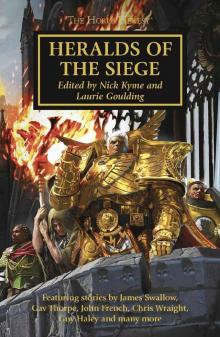 Heralds of the Siege
Heralds of the Siege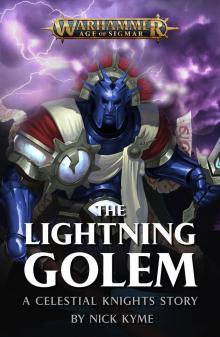 The Lightning Golem
The Lightning Golem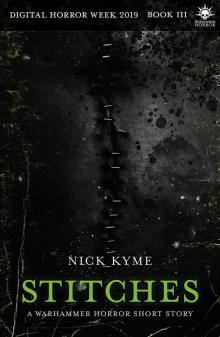 Stitches
Stitches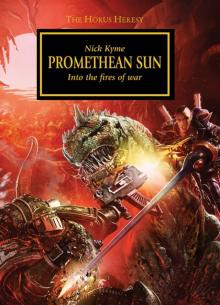 Promethean Sun
Promethean Sun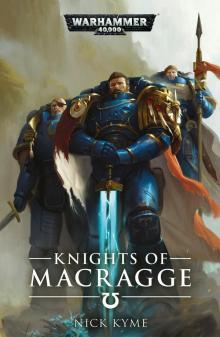 KNIGHTS OF MACRAGGE
KNIGHTS OF MACRAGGE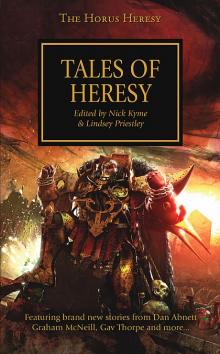 Tales of Heresy
Tales of Heresy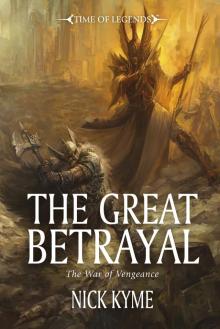 The Great Betrayal
The Great Betrayal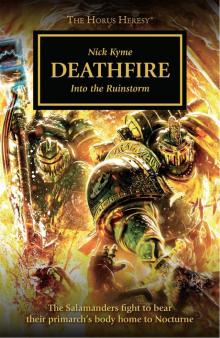 Deathfire
Deathfire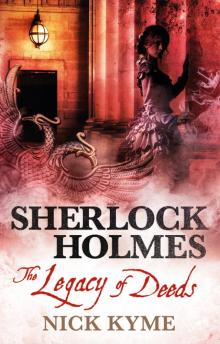 Sherlock Holmes--The Legacy of Deeds
Sherlock Holmes--The Legacy of Deeds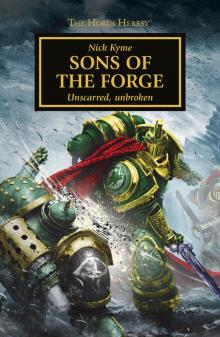 Sons of the Forge
Sons of the Forge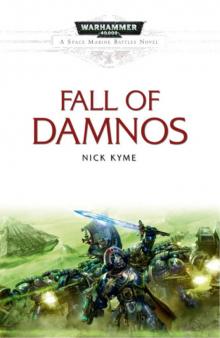 Fall of Damnos
Fall of Damnos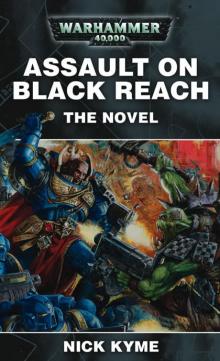 Assault on Black Reach: The Novel
Assault on Black Reach: The Novel![[Horus Heresy 10] - Tales of Heresy Read online](http://i1.bookreadfree.com/i/03/27/horus_heresy_10_-_tales_of_heresy_preview.jpg) [Horus Heresy 10] - Tales of Heresy
[Horus Heresy 10] - Tales of Heresy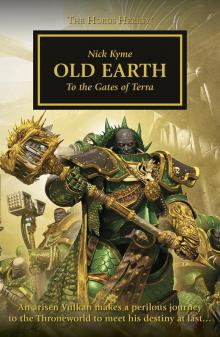 Old Earth
Old Earth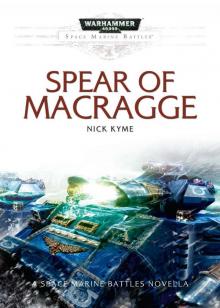 Spear of Macragge
Spear of Macragge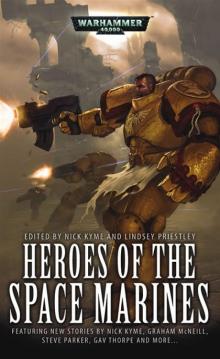 Heroes of the Space Marines
Heroes of the Space Marines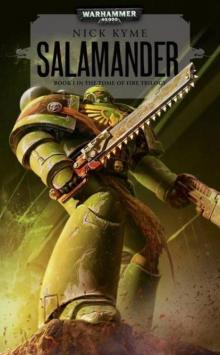 Salamander (warhammer 40000)
Salamander (warhammer 40000)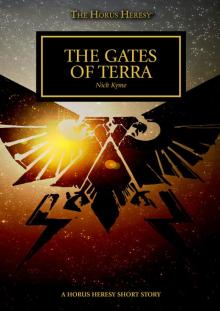 The Gates of Terra
The Gates of Terra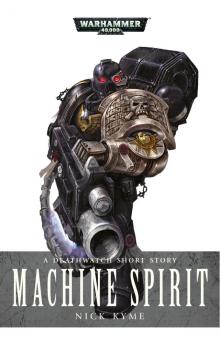 Machine Spirit
Machine Spirit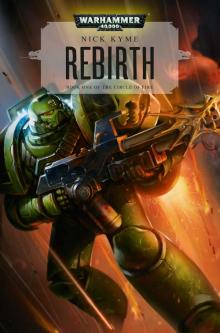 Salamanders: Rebirth
Salamanders: Rebirth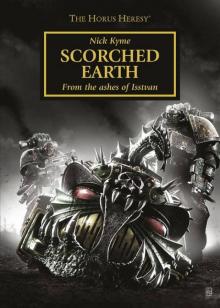 Scorched Earth
Scorched Earth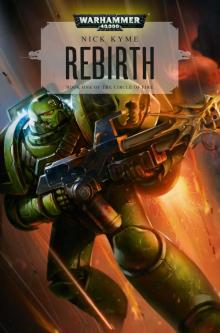 Rebirth
Rebirth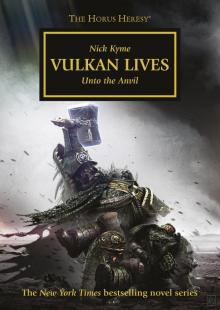 Vulkan Lives
Vulkan Lives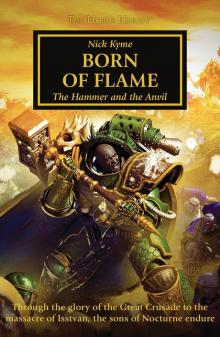 Born of Flame
Born of Flame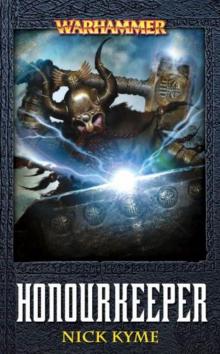 Honourkeeper
Honourkeeper